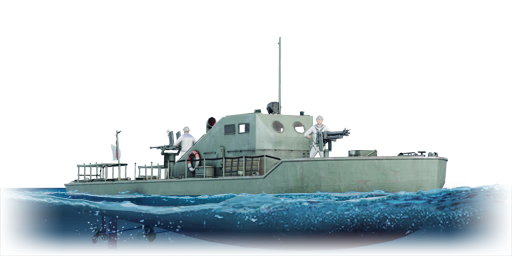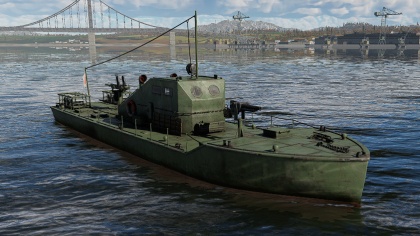Difference between revisions of "Ha-Go (mod. 1)"
(→History: add history of Ha-Go fighting boat project.) (Tag: Visual edit) |
(→History: Edits) |
||
| Line 48: | Line 48: | ||
== History == | == History == | ||
| − | Ha-Go Fighting Boat Model 1 (波號戦斗艇一型), also known Se-Ha (せは艇) | + | <!-- ''Describe the history of the creation and combat usage of the ship in more detail than in the introduction. If the historical reference turns out to be too long, take it to a separate article, taking a link to the article about the ship and adding a block "/History" (example: <nowiki>https://wiki.warthunder.com/(Ship-name)/History</nowiki>) and add a link to it here using the <code>main</code> template. Be sure to reference text and sources by using <code><nowiki><ref></ref></nowiki></code>, as well as adding them at the end of the article with <code><nowiki><references /></nowiki></code>. This section may also include the ship's dev blog entry (if applicable) and the in-game encyclopedia description (under <code><nowiki>=== In-game description ===</nowiki></code>, also if applicable).'' --> |
| + | Ha-Go Fighting Boat Model 1 (波號戦斗艇一型), also known Se-Ha (せは艇) was one of the first prototypes of small escort boats (小護衛艇) by the Imperial Japanese Army. It was designed to escort "Daihatsu"-class landing crafts that were transporting munitions to offshore islands. | ||
| − | In January 1944, Imperial Japanese Army 10th Technical Research Institute | + | In January 1944, the Imperial Japanese Army 10th Technical Research Institute ordered Hitachi Zosen Sakurajima shipyard to make two types of small escort craft. The first, called Ha-Go Fighting Boat Model 1 "Se-Ha" (Ha-Go meaning "Mark A"), was to be equipped with two 150 hp engines, and a second named the Ha-Go Fighting Boat Model 2 "Se-Ni" equipped with two 60 hp engines. |
| − | Se-Ni completed in October but speed | + | The Se-Ni was completed in October 1944 but the top speed was only 9 knots so the plan was cancelled. Se-Ha was eventually completed in December 1944, but after trials the engineers decided to try to modify the design to get more speed. |
| − | + | A third design, "Se-Ha Kai" was completed in July 1945. In a trial cruise during October 2-5, its speed reached 13 knots so research ended. By the surrender of Japan, it had not been formally adopted, but would have been officially named the Type 5 Small Escort Boat. ("Type 5" already in game is Large Escort Boat.) | |
== Media == | == Media == | ||
Revision as of 16:00, 20 October 2019
Contents
Description
The Ha-Go (mod. 1) is a rank II Japanese sub-chaser
with a battle rating of 1.7 (AB/RB/SB). It was introduced in Update 1.89 "Imperial Navy".
General info
Survivability and armour
Talk about the vehicle's armour. Note the most well-defended and most vulnerable zones, e.g. the ammo magazine. Evaluate the composition of components and assemblies responsible for movement and manoeuvrability. Evaluate the survivability of the primary and secondary armament separately. Don't forget to mention the size of the crew, which plays an important role in fleet mechanics. Save tips for preserving survivability in the "Use in battle" section.
If necessary, use a graphics template to show the most well-protected or most vulnerable points in the armour.
Mobility
Write about the ship’s mobility. Evaluate its power and manoeuvrability, rudder rerouting speed, stopping speed at full tilt, with its maximum forward speed and reverse speed.
Armament
Primary armament
Provide information about the characteristics of the primary armament. Evaluate their efficacy in battle based on their reload speed, ballistics and the capacity of their shells. Add a link to the main article about the weapon: {{main|Weapon name (calibre)}}.
Broadly describe the ammunition available for the primary armament, and provide recommendations on how to use it and which ammunition to choose.
Secondary armament
Some ships are fitted with weapons of various calibres. The secondary armament is defined as the weapon chosen with the control Select secondary weapon. Evaluate the secondary armament and give advice on how to use them. Describe the ammunition available for the secondary armament. Provide recommendations on how to use them and which ammunition to choose. Remember that anti-air armament, even heavy calibre weapons, belong in the next section.
If there is no secondary armament, remove this section.
Special armament
Depth charges, mines, rocket launchers and missiles are also effective in skilled hands and can take an off-guard opponent by surprise. Evaluate the ammunition of this type of armament and rate its performance in combat.
Usage in battles
Describe the technique of using this ship, the characteristics of her use in a team and tips on strategy. Abstain from writing an entire guide – don’t try to provide a single point of view, but give the reader food for thought. Talk about the most dangerous opponents for this vehicle and provide recommendations on fighting them. If necessary, note the specifics of playing with this vehicle in various modes (AB, RB, SB).
Pros and cons
Summarize and briefly evaluate the vehicle in terms of its characteristics and combat effectiveness. Mark its pros and cons in the bulleted list. Try not to use more than 6 points for each of the characteristics. Avoid using categorical definitions such as "bad", "good" and the like - use substitutions with softer forms such as "inadequate" and "effective".
Pros:
Cons:
History
Ha-Go Fighting Boat Model 1 (波號戦斗艇一型), also known Se-Ha (せは艇) was one of the first prototypes of small escort boats (小護衛艇) by the Imperial Japanese Army. It was designed to escort "Daihatsu"-class landing crafts that were transporting munitions to offshore islands.
In January 1944, the Imperial Japanese Army 10th Technical Research Institute ordered Hitachi Zosen Sakurajima shipyard to make two types of small escort craft. The first, called Ha-Go Fighting Boat Model 1 "Se-Ha" (Ha-Go meaning "Mark A"), was to be equipped with two 150 hp engines, and a second named the Ha-Go Fighting Boat Model 2 "Se-Ni" equipped with two 60 hp engines.
The Se-Ni was completed in October 1944 but the top speed was only 9 knots so the plan was cancelled. Se-Ha was eventually completed in December 1944, but after trials the engineers decided to try to modify the design to get more speed.
A third design, "Se-Ha Kai" was completed in July 1945. In a trial cruise during October 2-5, its speed reached 13 knots so research ended. By the surrender of Japan, it had not been formally adopted, but would have been officially named the Type 5 Small Escort Boat. ("Type 5" already in game is Large Escort Boat.)
Media
Excellent additions to the article would be video guides, screenshots from the game, and photos.
See also
Links to the articles on the War Thunder Wiki that you think will be useful for the reader, for example:
- reference to the series of the ship;
- links to approximate analogues of other nations and research trees.
External links
Paste links to sources and external resources, such as:
- topic on the official game forum;
- encyclopedia page on the ship;
- other literature.
| Japan sub-chasers | |
|---|---|





